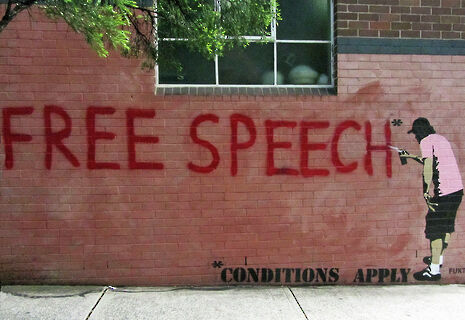The luxury of Free-Speech
Free speech only means something when granted to everyone, regardless of religious persuasion, says Abdulla Zaman

This year has seen rise to free-speech movements in universities. The practice of no-platforming and the setting up of safe spaces has received much criticism from student societies as well as by national newspapers. Students at LSE have even taken to set up a society, the LSESU Speakeasy, after their university was ranked as among the most censorious in the recently-published Free Speech University Rankings. Earlier this month, the Guardian entered the debate, asking whether a university should be a “safe space” for all or a place where anything can be debated, in response to the comedian Kate Smurthwaite’s Goldsmiths show being cancelled after student protest. As a Muslim student, I witness first-hand the limitations free speech restrictions can impose on day-to-day campus life. And at the end of the day, whether you agree or disagree with these movements, it does not change the fact that some people have the luxury of campaigning for free speech, while others do not.
The ‘war on terror’ and the situation in the Middle East has politicised Islam to the extent that the government has grown suspicious of its 2.7 million Muslim population. Recently there has been much discussion about the repercussions of the government’s ‘Prevent’ legislation. Its parameters have become so ambiguous that almost any action can be scrutinised as a basis for radicalisation. Educational authorities are expected to keep an eye on students that are ‘at risk of being drawn to terrorism’. The government has put so much pressure on educational staff to spot out signs of radicalisations that it’s even led to the labelling of a three year old. Even simple criticisms of the UK’s foreign policy can be construed as a ‘sign of radicalisation’. When our own Prime Minister labelled those who didn’t support the Syria airstrikes as ‘terrorist sympathisers’, it is at this point that free speech became less of an issue about offending people and more about being seen as a security threat.
As well as the personalised inspection, university societies also face much tighter regulations on who they can bring on campus and who can’t to speak for Islamic events or debates. New legislations has now made educational institutions accountable for staging speakers that might say something ‘problematic’. Even those who are ‘non-violent extremists’, those who are not advocating violence themselves, are indicted as well. I myself have had the experience of being asked by a member of staff to withdraw my invitation to a speaker to come because of the fear of being affected by this new law. Often, it is because the authorities have done a Google search on the speaker and have found that a single article labels him as an extremist. By its very nature, anyone on the internet can label you something without your consent, and any self-acclaimed Muslim speaker will almost inevitably have been called an extremist at some point along the line. The process is more troublesome because, as an organiser, you find yourself in danger of being associated with the ‘extreme views’ the authorities sought to block out. This results in an aversion among Muslims to set up discussions on topical issues due to the fear of being implicated. And this effectively is silence through censorship.
While all these free speech movements deal with student unions or societies, they still do not have to grapple with the university administration in the way Muslims have to. The struggle Muslims face against free speech, due to increasing governmental surveillance, is more structural and institutionalised than any protest ‘against the system’. The consequences of campaigning for free speech are more severe because it can led to monitoring, blacklisting and other limits to your own freedom. It is little wonder that few are brave enough to make that stand.
Free speech means very little if you do not stand up for everyone affected. None of these movements have spoken about how Muslims are being affected too. The justification of censorship for security and how it is limiting religious expression needs to be addressed. Otherwise it will just retain the status quo: while some people have free speech, Muslims will always have a higher price to pay.
 Comment / Why shouldn’t we share our libraries with A-level students?25 June 2025
Comment / Why shouldn’t we share our libraries with A-level students?25 June 2025 News / Lord Mandelson visits University30 June 2025
News / Lord Mandelson visits University30 June 2025 Features / 3am in Cambridge25 June 2025
Features / 3am in Cambridge25 June 2025 Theatre / Twelfth Night almost achieves greatness26 June 2025
Theatre / Twelfth Night almost achieves greatness26 June 2025 Features / What it’s like to be an underage student at Cambridge29 June 2025
Features / What it’s like to be an underage student at Cambridge29 June 2025




